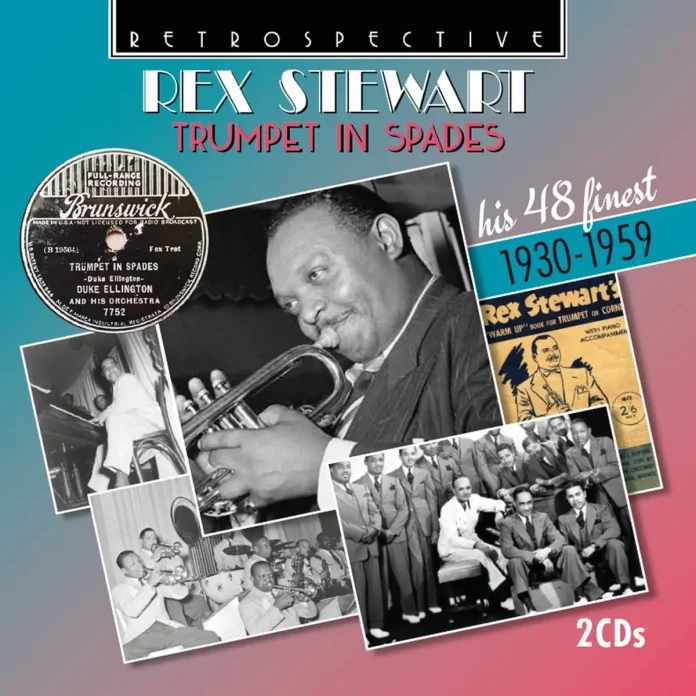Familiarity, arguably more than the amount of time passed between when music was recorded and when it’s reviewed, makes reviewing a relatively easy task, and this judiciously selected double-disc overview of Rex Stewart’s career on record makes the point nicely.
Emerging on the scene as he did with Ellington in the 1930s, after stints with Fletcher Henderson and McKinney’s Cotton Pickers, perhaps inevitably ensured that he was in Armstrong’s shadow, along with everyone from Henry Red Allen to Johnny Dunn, but it’s true to say that in his way Stewart was quietly carving out his own identity from the off, as he does here on the title track, cut with Ellington on 17 July 1936.
The sides Stewart & his Feetwarmers cut in Paris in April of 1939 will always for me be sublime examples of small-group swing, along with some tracks (not in this set) of the John Kirby Sextet, the 1941 Edmond Hall Celeste Quartet and the All Star Quintet recorded three years later, both for Blue Note.
Of those April 1939 sides, Montmartre is still nothing less than a meeting of minds, and the bright insouciance of the music still lifts the spirit in a way that, in a world even more censorious than the one we currently know, would be illegal, while Finesse, more laidback by measures, qualifies surely as chamber jazz of the highest order.
The live offering of Boy Meets Horn is from 7 November 1941 and is a showcase not only for Stewart’s half-valving skills but also his own personal take on the jazz trumpet language to that date, full of personality and with more than a soupcon of “tasteful” humour.
While we’re on the subject of humour and indeed implied humour, Little Sir Echo from 1958 and the “novelty” album The Talkative Horns Of Rex Stewart & Dicky Wells, is proof positive that the efforts of committed musicians can trump dodgy / flimsy marketing concepts every time. The music moves along at a breezy, effortless pace and Stewart and Wells “talk” the pre-bop jazz language with the fluency of masters.
Discography
CD1: Trumpet In Spades; Rocky Road; Just Blues; Sugarfoot Stomp; Singin’ The Blues; Do You Believe In Love At Sight?; New King Porter Stomp; In A Sentimental Mood; Kissin’ My Baby Goodnight; Rexatious; Lazy Man’s Shuffle; The Back Room Romp; Tea And Trumpets; Braggin’ In Brass; San Juan Hill; Fat Stuff Serenade; Montmartre; Finesse; I Know That You Know; Solid Old Man; Barney Goin’ Easy; Tootin’ Through The Roof; Morning Glory; Dusk; Cherry; Bugle Call Rag (79.24)
CD2: Diga-Diga-Doo; Ain’t Misbehavin’; Save It, Pretty Mama; Across The Track Blues; Without A Song; Mobile Bay; Linger Awhile; Boy Meets Horn; The World Is Waiting For The Sunrise; The Big Eight Blues; John Hardy’s Wife; Subtle Slough; Menelik, The Lion Of Judah; Main Stem; Rexercise; Shady Side Of The Street; I’m Beginning To See The Light; I Knew You When; The Way She Walks; A Hundred Years From Today; Little Sir Echo; Everybody’s Movin’ (79.58)
Stewart (c) with Duke Ellington & His Famous Orchestra, Barney Bigard & His Jazzopaters, Sidney Bechet & His New Orleans Feetwarmers, Jack Teagarden & His Big Eight and others. Various locations from 3 November 1930 to 20 January 1959 inclusive.
Retrospective RTS 4405
















